
Big Data Mining and Analytics
Scope & Guideline
Advancing Knowledge Through Data Innovation
Introduction
Aims and Scopes
- Big Data Analytics:
The journal covers advanced techniques and frameworks for analyzing large and complex datasets, enabling insights in fields such as healthcare, finance, and social sciences. - Machine Learning Applications:
Research related to the application of machine learning algorithms for predictive analytics, classification, and anomaly detection across diverse sectors. - Interdisciplinary Approaches:
It promotes interdisciplinary research that combines big data with fields like genomics, environmental science, and social media analytics, fostering novel insights. - Data Security and Privacy:
The journal addresses concerns related to data security and privacy, particularly in the context of big data environments, including blockchain and differential privacy methodologies. - Graph and Network Analysis:
Focus on graph-based methods for data representation and analysis, including applications in social networks, biological networks, and financial fraud detection. - Multimodal Data Integration:
Research on techniques for integrating and analyzing multimodal data sources, enhancing predictive capabilities and insights across various applications.
Trending and Emerging
- Interpretable AI and Explainability:
There is an increasing focus on developing interpretable AI models that provide insights into their decision-making processes, particularly in critical applications like healthcare and finance. - Privacy-Preserving Techniques:
Research on privacy-preserving techniques, such as differential privacy and blockchain solutions, is gaining traction, reflecting the growing importance of data security in big data applications. - Multimodal and Heterogeneous Data Fusion:
The integration of multimodal data sources and heterogeneous information is emerging as a key theme, enabling more comprehensive analyses and insights. - Graph Neural Networks (GNNs):
The application of graph neural networks for analyzing complex relationships in data is trending, driven by the need for advanced techniques in social network analysis and fraud detection. - AI and Machine Learning in Healthcare:
There is a significant uptick in research applying AI and machine learning techniques to healthcare-related problems, including disease diagnosis and predictive modeling. - Real-Time Data Analytics:
The demand for real-time data analytics is increasing, particularly in applications like IoT and smart cities, where timely decision-making is crucial.
Declining or Waning
- Traditional Statistical Methods:
There has been a noticeable decrease in the publication of papers relying solely on traditional statistical methods for data analysis, as the field shifts towards more complex machine learning and AI approaches. - Basic Data Mining Techniques:
Basic data mining techniques such as simple clustering and association rule mining are appearing less frequently, likely due to the rise of more sophisticated methodologies and frameworks. - General Surveys on Big Data:
Surveys that provide general insights into big data without a specific focus or novel contributions are becoming less prominent, as the journal emphasizes innovative and application-driven research. - Low-Dimensional Data Analysis:
Research focused solely on low-dimensional data analysis is waning, as the emphasis shifts towards handling high-dimensional and complex data typical in big data contexts. - Manual Data Processing Techniques:
Papers discussing manual or semi-automated data processing techniques are declining, reflecting the increasing automation and sophistication of data processing methodologies.
Similar Journals
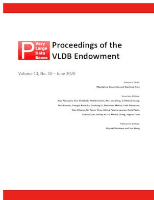
Proceedings of the VLDB Endowment
Unlocking insights in database management technologies.Proceedings of the VLDB Endowment is a prestigious academic journal published by the Association for Computing Machinery, focusing on advanced research in the field of computer science, particularly in areas related to database management, big data, and information systems. With an impressive Impact Factor reflecting its Q1 categorization in the Computer Science (miscellaneous) quartile, the journal ranks #12 out of 133 in its field according to Scopus, placing it in the 91st percentile. The journal serves as a vital platform for disseminating high-quality research findings and fostering innovation in data management technologies. The VLDB Endowment, in operation since 2008, embraces an open-access model, ensuring that valuable insights reach a broad audience, including researchers, professionals, and students who are eager to push the boundaries of knowledge in computer science. With its commitment to excellence, this journal significantly contributes to the ongoing dialogue within the global research community.
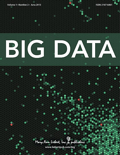
Big Data
Exploring the future of data management.Big Data, an esteemed journal published by MARY ANN LIEBERT, INC, serves as a leading platform within the realms of computer science and information systems. Launched in 2013, this journal has made significant strides in shaping the discourse around the management, analysis, and applications of large-scale data. With a commendable impact factor reflected in its 2023 quartile rankings—Q1 in Information Systems and Management, and Q2 in both Computer Science Applications and Information Systems—Big Data is recognized for its quality and influence, holding a notable position in Scopus rankings. Renowned for its rigorous peer-review process, the journal welcomes original research, reviews, and discussions that address the challenges and innovations associated with big data technologies. Researchers, professionals, and students alike will find Big Data an indispensable resource that not only highlights emerging trends but also fosters collaboration and knowledge sharing within the data science community. Access options are available through institutional subscriptions and individual access, ensuring a broad dissemination of critical research findings.

KNOWLEDGE AND INFORMATION SYSTEMS
Navigating the Evolving Landscape of Human-Computer InteractionKNOWLEDGE AND INFORMATION SYSTEMS, published by SPRINGER LONDON LTD, is a distinguished journal in the field of information systems, artificial intelligence, and human-computer interaction. With its ISSN 0219-1377 and E-ISSN 0219-3116, this journal has built a robust reputation since its inception, featuring a convergence of valuable research from 2005 through 2024. Catering to a diverse academic audience, it is classified among the leading journals in its category, proudly holding a Q1 ranking in Information Systems and Q2 rankings in multiple other domains. The journal aims to publish cutting-edge research that not only advances theoretical understanding but also provides practical applications within these rapidly evolving fields. Although it is not an Open Access journal, subscribers can access a wealth of knowledge critical for researchers, practitioners, and students looking to enhance their expertise. With a 2023 Scopus rank placing it within the 66th percentile for Information Systems, KNOWLEDGE AND INFORMATION SYSTEMS is an invaluable resource for those committed to pushing the frontiers of knowledge in technology and information science.

International Journal of Advanced Computer Science and Applications
Fostering Collaboration for Tomorrow’s Tech Solutions.International Journal of Advanced Computer Science and Applications, published by SCIENCE & INFORMATION SAI ORGANIZATION LTD, stands as a significant platform in the ever-evolving field of computer science. With its ISSN 2158-107X and E-ISSN 2156-5570, the journal aims to disseminate high-quality research and innovations from diverse areas within computer science, embracing cutting-edge technologies and methodologies. As of 2023, it holds a commendable Q3 ranking in the field, placing it among a competitive cohort of journals while showcasing its commitment to scholarly excellence. The journal operates under an open access model, ensuring that its content is widely accessible to researchers, professionals, and students alike, thereby fostering a collaborative environment for knowledge-sharing and advancing the discipline. With a history of converged contributions from 2017 to 2024, the International Journal of Advanced Computer Science and Applications serves as a vital resource for those seeking to stay at the forefront of computer science research and applications.
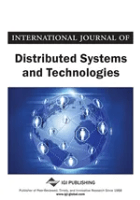
International Journal of Distributed Systems and Technologies
Innovating Connections in Technology and Networks.Welcome to the International Journal of Distributed Systems and Technologies, a prominent academic platform published by IGI Global dedicated to advancing the field of distributed systems and technologies. With an ISSN of 1947-3532 and an E-ISSN of 1947-3540, this journal, established in 2010 and continuing through 2024, offers a unique venue for researchers, professionals, and students to disseminate their findings in the realms of computer networks, communications, hardware, and architecture. Despite its current placement in the Q4 quartile for both computer networks and communications and hardware and architecture categories in 2023, the journal is committed to fostering innovative solutions and interdisciplinary collaboration that can drive future advancements. Although not open access, contributions to this journal not only receive rigorous peer review but also have the potential to significantly impact the community, underscored by a focus on applicable research that addresses the emerging challenges in technology. As part of a rich repository, the journal invites you to explore its latest issues and join in shaping the future of distributed systems.
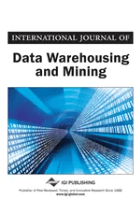
International Journal of Data Warehousing and Mining
Empowering Insights Through Data InnovationInternational Journal of Data Warehousing and Mining, published by IGI Global, is a vital resource in the field of data management and analytics, catering to researchers, professionals, and students alike. With ISSN 1548-3924 and E-ISSN 1548-3932, this journal has been at the forefront of disseminating pioneering research since its inception in 2005 and will continue to do so through 2024. Despite its current categorization in the Q4 quartile for Hardware and Architecture as well as Software, and its Scopus rankings, the journal aims to foster innovation within the domains of data warehousing, data mining, and their applications across various sectors. The absence of an open access option does not diminish its significance; rather, it ensures that the journal maintains rigorous peer-review standards, providing high-quality research outputs that contribute to ongoing discussions and advancements within the field. Researchers and practitioners looking to stay updated on the latest trends and methodologies will find the International Journal of Data Warehousing and Mining an indispensable tool in their academic and professional endeavors.
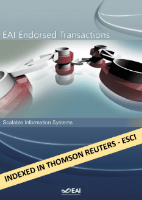
EAI Endorsed Transactions on Scalable Information Systems
Fostering Collaboration for a Scalable FutureEAI Endorsed Transactions on Scalable Information Systems is a distinguished open access journal published by the INST COMPUTER SCIENCES, SOCIAL INFORMATICS & TELECOMMUNICATIONS ENG-ICST, Belgium. Since its inception in 2014, the journal has become a vital platform for disseminating cutting-edge research in computer networks, information systems, and scalable communications technologies, striving to enhance our understanding and implementation of scalable approaches in information systems. With a commendable impact in the field, it has achieved a Q3 ranking for multiple categories such as Computer Networks and Communications, Computer Science Applications, and Software in 2023. The journal aims to foster innovation and collaboration among researchers, practitioners, and educators, facilitating the exchange of scholarly articles that address critical challenges and developments in the rapidly evolving landscape of information systems. By providing a free and accessible platform for high-quality research, the journal plays an essential role in elevating the discourse within the fields of computer science and information technology.
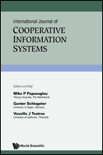
INTERNATIONAL JOURNAL OF COOPERATIVE INFORMATION SYSTEMS
Exploring Synergies in Computer Science and Information SystemsINTERNATIONAL JOURNAL OF COOPERATIVE INFORMATION SYSTEMS
Published by WORLD SCIENTIFIC PUBL CO PTE LTD, the INTERNATIONAL JOURNAL OF COOPERATIVE INFORMATION SYSTEMS plays a pivotal role within the fields of Computer Science and Information Systems. With a focus on the development and application of cooperative information systems, this journal aims to foster innovation and collaborative research among scholars and professionals. Established in 1996, the journal has consistently published high-quality research that contributes to a better understanding of cooperative methodologies, enhancing system efficiencies across various applications. While its impact factor remains undisclosed, the journal is positioned in the Q4 category of the Scopus rankings, indicating a growing presence in the academic community. Although it does not offer open access, its rich repository of articles remains accessible to subscribers and relevant institutions. Located in Singapore, this journal will continue to serve as a critical resource for researchers, practitioners, and students keen on exploring the evolving dynamics of information systems in today's interconnected world.

Internet Technology Letters
Advancing the Frontiers of Internet Technology.Internet Technology Letters, published by John Wiley & Sons Ltd, is a dynamic and rapidly evolving journal that focuses on the innovative applications and developments within the realms of Artificial Intelligence, Computer Networks and Communications, Information Systems, and Software. With its E-ISSN 2476-1508 and a defined convergence period from 2018 to 2024, this journal seeks to address emerging trends and critical challenges confronting the digital landscape today. Recognized in the Q3 quartile range across multiple computer science categories in 2023, it serves as a valuable resource for researchers, professionals, and students seeking to advance their knowledge and stay updated on significant technological advancements. While currently not an open-access journal, Internet Technology Letters holds a prominent position on platforms like Scopus, ranked within the middle percentiles, reflecting its contribution to the academic community. The journal aims to foster connectivity between academia and industry, encouraging submissions that promote interdisciplinary collaboration and innovation. By creating a platform for sharing groundbreaking research, Internet Technology Letters plays a crucial role in shaping future technological landscapes.
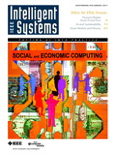
IEEE INTELLIGENT SYSTEMS
Exploring the Future of Artificial IntelligenceIEEE Intelligent Systems, published by the renowned IEEE Computer Society, stands at the forefront of research in the fields of Artificial Intelligence and Computer Networks and Communications. With an impressive Q1 ranking in both categories as of 2023 and Scopus rankings placing it in the top 5% of its field, this journal not only showcases cutting-edge scientific advancements but also serves as a vital resource for practitioners, academics, and students seeking to deepen their understanding and application of intelligent systems. The journal covers a broad range of topics including machine learning, data mining, and system architectures, reflecting its commitment to addressing contemporary challenges and innovations in technology. Although it does not offer open access, the journal's research contributions are invaluable, ensuring that its readership remains engaged with the latest findings and applications in a rapidly evolving field. For those interested in submitting high-quality research or staying updated on the latest developments, IEEE Intelligent Systems represents an essential hub of knowledge.